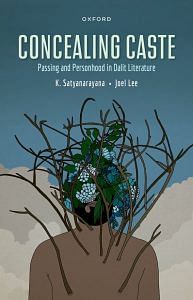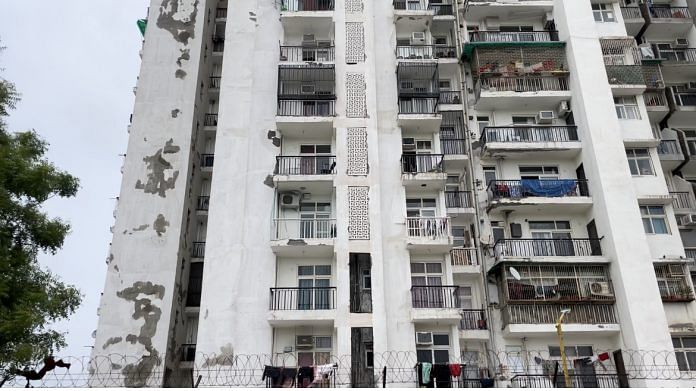It had been just three or four days since I arrived in Allahabad. Thus far, I was staying at the home of Devi Dayal ji, a relative of my friend Radhacharan Vidyarthi from Ghaziabad. In those three or four days, I went with Devi Dayal and some of my colleagues at the bank to see a number of apartments for rent. When people learned that I was a bank employee, they were keen to rent to me. They explained their terms and gave me a tour of the rooms. But landlords must collect information on their renters, so they asked me questions as well. They asked me what district and village I came from, they asked about my family, they asked about my name and ultimately, they arrived at caste. When I said that I’m Jatav—a Scheduled Caste—a sudden change overtook their faces. Their third eye opened. The hospitable warmth evaporated.
They suddenly remembered that the room, which a moment earlier had been available and which they had all but given me to rent, was actually already rented out to someone else. Or they suddenly recalled that their son or daughter had an upcoming wedding, and after all they needed the room themselves to accommodate guests. I had two other companions who had joined the bank at the same time I had. One, Ramhet, hailed from a village in Agra District in Uttar Pradesh, while the other, S. S. Poddar, came from Chandrapur in Maharashtra. Alongside his name, Ramhet wrote ‘Nigam’ as his title, and because ‘Nigam’ is a brahmin gotra, no one would ask Ramhet about his caste. Poddar, for his part, spoke Bengali and kept the company of Bengalis. Moreover, his ‘Poddar’ title announced that he was savarna. Thus no one asked him about his caste either.
If the person in front of you finds out that you’re savarna, then no matter what particular caste you may be, he will not ask you your caste. But if the person in front of you isn’t sure whether you’re savarna, then you will undoubtedly be asked your caste. From this, it follows that the primary intention in asking about caste is to learn whether someone is savarna or avarna, respectable or untouchable. Because their mere utterance of ‘Poddar’ and ‘Nigam’ made clear that my friends were savarna, savarna landlords had no difficulty renting rooms to them. But my title was ‘Kardam’. Just hearing my title, many people understood that I was Scheduled Caste and thus avarna.
As for those who were uninformed as to whether Kardam signified savarna or avarna status, they asked me straight away, and I answered with total clarity. Hence, I was unable to obtain a room for rent. My colleagues at the bank said, ‘Why do you tell them that you’re Scheduled Caste? Arre, brother, you need to rent a room, you need to get this underway, so do it however you have to. People are going to ask. So just tell them any caste, what difference does it make? At least you’ll find a room that way’. But on this matter, I was not prepared to compromise my dignity, and I continued to be denied a room. It’s not that Poddar and Ramhet were lacking in critical consciousness. They, too, were socially awakened, but they were able to compromise with their ideals for the sake of a room. With me, this was not happening.
After several days of rejections, I approached Mewa Lal, the sanitation worker in our bank. Mewa Lal belonged to the ‘Hela’ caste. The Hela caste traditionally performs the same labour that those called ‘Bhangi’ perform in other parts of north India. The word Hela possibly derives from ‘hel’, such that Hela would mean ‘carriers of hel’. Notably, baskets used to transport human and animal faeces, rubbish, and other leavings are called hel. Hela is related to Maharashtra’s Mela, an Apabramsha word. Maharashtra’s famous saint Chokha Mela belonged to this caste. Mewa Lal found an apartment for me in his own basti. [ . . . ] I resolved to stay in the place Mewa Lal found for me.
The next day I had packed my belongings to move there from Devi Dayal’s place, when, that very day, Shri Banke Lal ji came to the bank and insisted on taking me to his home. Banke Lal ji was a clerk in the CDA Pension Office. He was from a village in Bulandshahr District, and was the elder brother of my uncle Harpal Singh’s friend Lal Singh. Banke Lal lived in the neighbourhood of Bhola ka Pura in Sulem Sarai. He lived with his wife, three daughters, and one son. These children were small, the same size as my little sister and brother were then.
Banke Lal ji’s elder son Bobby was doing his studies in Jalalpur, where he lived with his uncle Lal Singh. Within just a couple of hours of coming to Banke Lal’s house, everyone mingled with me so freely that I felt I was with my own family. Because he was my uncle’s friend’s brother, I called him uncle and his wife aunty. Their children were like my little siblings. That night I stayed at Banke Lal’s house. We talked late into the night. He told me, ‘Around here everyone has drunk the poison of casteism. It’s not easy for a Dalit to find a room in the house of a savarna. You’ll only get a room here if you conceal your caste. I became a Varma to live here’.
I felt that hiding caste for the sake of a house was like selling one’s caste pride at a pawn shop. ‘Why do you hide your caste?’ I asked Banke Lal ji. ‘Why don’t you openly say that you’re Jatav? If you don’t get a place in a savarna’s house—what of it? You can find a place in the house of a Pasi or a Hela or some other Scheduled Caste, and you can live there. Wherever you live, you should live with pride’. He explained, ‘Look, Jai Prakash, I have no inward sense of inferiority about my caste and I have no hesitation in speaking the truth about it. But there are certain things because of which, sometimes, even when you’d rather not, you have to take some refuge from the truth’.
He went on, ‘Look, we’re far from home here, living in a region not our own. We should focus on our work and mind our own business. But just minding our own business also doesn’t work. There are other concerns, too, other entanglements. You’re not yet acquainted with the environment out here, with the truth of this place. But slowly, slowly, you too will learn it well’. That day I said nothing more to Banke Lal on this matter. But in our dialogue that night we came to understand a great deal about each other. Banke Lal ji developed an affection for me. He said, ‘Being two men from the same place, it will be good for us to live together here. You won’t have to be alone, and I’ll also have you here for support. When needed we can help each other’.
I liked his idea and accepted the invitation to move in with his family. The next day I shifted my belongings to Banke Lal’s house. I said I would make arrangements for a separate room, but he said, ‘We’re going to the village, it’s my younger brother’s wedding. Until we come back, just stay here in our home. After we get back, we can see about a separate room. Anyway, what is the point in paying rent on an empty house for all the days we’re away?’ At his kind and generous suggestion, I stayed at their home until their return. One Sunday evening, I was sitting on the verandah reading when the landlord, Surender Srivastav, came up to me. For a little while, he spoke of trifling things, and then he asked, ‘What caste are you?’ My impulse was to declare ‘I am Jatav’ with my customary boldness. But then I recalled what Banke Lal had told me: that if the landlord discovers we are Scheduled Caste, no one will let us rent. I thought: this is a place where the difference between having and not having shelter is altogether dependent on caste. If I say that I’m a Scheduled Caste Jatav, Banke Lal ji might be made to clear out of his house. Secondly, Banke Lal lives with his caste concealed. He socializes with Surender Srivastav’s family and many others like them—eats and drinks with them, visits, mingles. Given all this, if the secret were to emerge that he’s not savarna but is Scheduled Caste and has been lying about it, his position is likely to fall hard, and once a person’s position has fallen, once people see him with contempt, then a garden of woes is planted for him.
Though I was no less an advocate of caste pride, and though feelings of inferiority were not my nature, I could see that my speaking the truth at this moment could precipitate a crisis of serious proportions for Banke Lal ji. Thus, though I did not want to and though it opposed my own precepts, I lied. ‘I’m a Jat’, I said. There were two calculations in my saying that I was a Jat. First, there are some Jats who take the title Varma. Second, all that stands between Jat and Jatav is that soft second syllable. In case Surender Srivastav were to discover at some future time that I am not Jat but Jatav, I could claim that I had actually said ‘Jatav’ and that he must have misheard me. ‘And Varma ji?’ This was Srivastav’s next question. I was startled. Did Srivastav have some doubt regarding Banke Lal ji’s being savarna? His question gave my conundrum a further twist. I knew Banke Lal ji had claimed to be a Varma, but I did not know which Varma he had in mind: Jat Varma, Sunar Varma, Kayasth Varma, or some other? After all, there are Jats who take the title Varma, as well as Sunars and Kayasths.
Surender Srivastav’s own elder brother used the title Varma. He offered the question like a dish of poison pudding. Somehow, I had to eat it and keep smiling. I said what seemed safest: ‘Actually I don’t know. The fact is, he’s the brother of an acquaintance of my uncle’s. And I’m from Ghaziabad, while he’s from Bulandshahr’. ‘Arre, but I thought you two were from the same village’, Srivastav expressed his surprise, ‘and that’s why there’s such intimacy between you’. ‘No’, I said innocently, ‘but when you move to a different region altogether, then people from just a hundred miles from your village seem like they belong to your own household’. I concealed a truth, but under a pile of sincerity. ‘True, that’s how it is’, said Srivastav ji. Then with a few more meaningless remarks he set off again. Although it was for Banke Lal ji’s sake and not my own that I was compelled to lie, nonetheless this conversation perturbed me for many days.
 This excerpt from Jai Prakash Kardam’s story in ‘Concealing Caste: Passing and Personhood in Dalit Literature’, edited by K. Satyanarayana and Joel Lee, has been published with permission from Oxford University Press.
This excerpt from Jai Prakash Kardam’s story in ‘Concealing Caste: Passing and Personhood in Dalit Literature’, edited by K. Satyanarayana and Joel Lee, has been published with permission from Oxford University Press.



